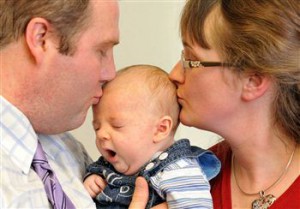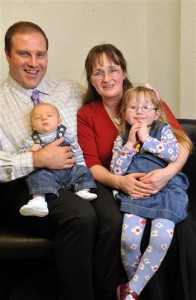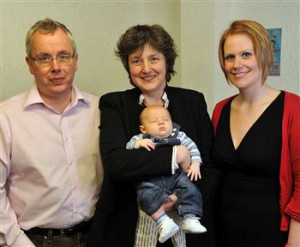
Lee and Stephen Smith, from East Lothian, were one of three couples to take advantage of the IVF-style tests, which screen for single gene disorders.
Baby Thomas was born on 14 November last year and after a final set of tests, doctors confirmed he does not have the condition.
Stephen, 37, said when their first child, four-year-old Eden, was diagnosed with cystic fibrosis, the pair had no idea they were both carriers of the ‘faulty gene’ which causes it.
He said: “There is no history of it in either of out families so we didn’t suspect a thing.”
They decided to undergo the treatment when trying for a second child as they said the one-in-four chance of them having another baby with the condition was too big a risk.
Mum Lee, 40, said: “We 
“Although she is generally quite well we have to be careful she doesn’t catch any infections, as her immune system isn’t as able to fight infection.
“Having two children with cystic fibrosis can mean they constantly keep passing infections back and forth.
“We decided we couldn’t risk our children’s health like that.
“Looking after one child who has cystic fibrosis can be tough at times, but if you had two children with the condition, trying to ensure both were kept well and didn’t cross infect each other would be much more difficult.
“We always knew that we wanted another child, and we were really pleased when we got the opportunity to undergo this treatment, as it means we didn’t have to change our plan to have two children.
“We were really lucky that it worked for us first time – I was keen to get things moving as my biological clock was ticking.”
Stephen added: “We’ve been lucky in many ways because no other children at Eden’s school have cystic fibro
“But we always wanted her to have a younger brother or sister – whilst keeping them both as healthy as possible.”
The Western General in Edinburgh is Scotland’s first and only hospital to offer the pre-implantation testing, and can now take up to 15 couples a year.
Specialists estimate the success rate will be about one-in-three, going by their first round of testing, as two other couples started the process at the same time but only Lee and Stephen were successful.
Around one-in-25 people carry the faulty gene, but it is only when two carriers have a child together that the condition can be passed on.
There is a one-in-four chance that a child born from two carriers of the faulty gene will have cystic fibrosis and a one-in-two chance of being a carrier.
Pre-implantation genetic diagnosis involves the testing of embryos, created through IVF treatment, to ensure they are free of genetic conditions, before they are implanted.
Dr Mary Porteous, a consultant in clinical genetics for NHS Lothian, carried out the genetic testing for the treatment.
She said: “It is fantastic that we are now able to offer this treatment for couples who are affected by single gene defects, and I am pleased that Lee and Stephen were the first couple to benefit from it.
“The treatment is only offered to couples w
“We now have five other couples who are undergoing the tests who have come to us from all over the country – two from the Lothians, Glasgow, Aberdeen and Dundee.
“And we hope to bring between six and eight more couples through before April.”
Dr Porteous and her team at the Western General – which includes Dr Jon Warner and clinical scientist Jenna McLusky – say this has been the high point of all of their careers so far.
Dr Porteous added: “Being able to carry out pre-implantation genetic diagnosis for single cell defects is a tremendous step forward and I hope this will benefit many more families in Scotland.”

